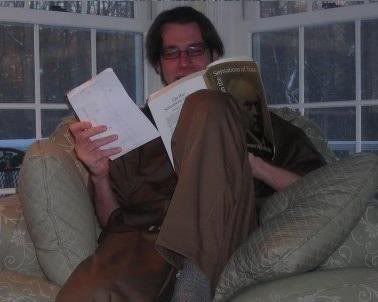Can a Computer Be a Composer?
An Essay by David Lampert
Touro College, DMX
April 2007
An Essay by David Lampert
Touro College, DMX
April 2007
The composition of music is a mental feat of remarkable intricacy. While it is not overtly obvious, musical composition is a number game. It has been long known, since at least Pythagoras in the second century B.C.E., probably longer, that the essence of the musical scale is the numerical relationships between the degrees of the scale. Theories of melody, harmony, structure, rhythm obviously, all of these components of music can be analyzed as numerical permutations. And no one is better at number permutations than a computer.
Can a computer, then, be a composer?
In 1950, Alan Turing proposed that if a computer can produce a response indistinguishable from a human response, then the computer exhibits humanlike intelligence. If a computer can produce music that is indistinguishable from humanly composed music, according to this diagnostic, then the computer is a composer.
There are no more than three possible ways for causation to occur in the world: By predetermination (natural or otherwise), by randomness, or by free choice. It is debatable whether all three actually exist as causal agencies in the world, and if they do not, which one(s) do(es).
Nature produces sounds: The rolling of the river, the songs of the birds and insects, the rustling of the leaves. These sounds are often beautiful. They are produced and arranged by randomness. Is the forest a composer of music? If the answer is no, which I suspect is the case, then to be a composer is not merely to run a process and end up with beautiful sound.
But computations are not merely random events. Computer programs are forms, and though they do not predict or anticipate the content they will have to process (input from the user, for example), the processes they undergo to deal with the content are predictable. Music is methodical, and for a computer to compose music, it needs a method. However, music cannot be strictly predetermined either, because if so then the same program will always produce the same piece of music, which renders the programmer the composer and not the computer. In all music composition programs, there is a randomization factor, (based on the computer’s clock usually.)
“In 1787 Mozart composed the Musikalisches Wurfelspiel (Musical Dice Game). This composition was a series of precomposed measures arranged in random eight-bar phrases to build the composition. Each throw of a pair of dice represented an individual measure, so after eight throws the first phrase was determined.”
I am compelled to determine that Mozart, the programmer, and not the dice or computer, is the composer of any piece of music composed by this sort of method. First, all the phrases are pre-composed. Thus, they are already composed by the composer before they were fed to the computer. Thus, the computer does not compose them. Second, if the phrases go together musically, they were pre-composed to go together musically. However, a program with a hundred thousand phrases to choose from will have to have rules built in to determine which phrases (parts, chord progressions, key changes, etc.) go together. But might such a program be capable of generating good original music?
At the time of this writing, my opinion is no. A most important factor will be missing.
Another set of music generating programs use “evolutionary methods”, where the computer attempts multiple solutions to musical problems, which are controlled by a selection factor. Suitable solutions are reinforced, made to repeat in subsequent projects, while unsuitable ones are cut. However, who determines which solutions are suitable and which ones aren’t? “The results of the process are supervised by the critic, a vital part of the algorithm controlling the quality of created compositions”
Third, then, and of utmost importance: Computers have no taste. Mozart’s dice game doubtless produced some musical pieces that were better than others. However, which pieces those were were not determined at all by the process that produced them, but by the human listeners. Occasionally, perhaps frequently, a computer program will come up with a good piece of music, but as long as the piece follows the rules of music – nay, as long as the piece follows the rules of the program, the computer will not be able to determine whether it has produced a piece of music worthy of the name.
I have listened to a number of computer composed pieces of music (some are linked to Wikipedia’s article “Algorithmic Composition”). They suck. Many of them are pretty, to be sure. For example, the most common genre of computer composition I have encountered consists of forever-meandering, new agey, structureless soundscapes. But we have determined, as regarding the sounds of nature, that mere prettiness of sound is not sufficient to qualify as music. Random sounds can be pretty, especially to one who is open-minded to it. And, if occasionally such processes do result in compelling musical ideas, that is not to the computer’s credit at all, because the computer cannot distinguish worthy musical ideas from unworthy ones.
Also, to be fair, my listening did not qualify as a Turing test, because I already knew that I was listening to computer generated music. I think I’m open-minded, but I am not immune to bias. Even the most human of them sounded mechanical to me.
It is interesting, however, that the names of the pieces are always listed with the names of the human composers. Interesting, because if the computers are the composers, the humans don’t deserve credit. Perhaps it is egotism on the part of the composers, but I think it is a tacit acknowledgement that whatever technology used as tools, it is the human being alone that composes.
